Tobias Meuser
FairStream: Fair Multimedia Streaming Benchmark for Reinforcement Learning Agents
Oct 28, 2024Abstract:Multimedia streaming accounts for the majority of traffic in today's internet. Mechanisms like adaptive bitrate streaming control the bitrate of a stream based on the estimated bandwidth, ideally resulting in smooth playback and a good Quality of Experience (QoE). However, selecting the optimal bitrate is challenging under volatile network conditions. This motivated researchers to train Reinforcement Learning (RL) agents for multimedia streaming. The considered training environments are often simplified, leading to promising results with limited applicability. Additionally, the QoE fairness across multiple streams is seldom considered by recent RL approaches. With this work, we propose a novel multi-agent environment that comprises multiple challenges of fair multimedia streaming: partial observability, multiple objectives, agent heterogeneity and asynchronicity. We provide and analyze baseline approaches across five different traffic classes to gain detailed insights into the behavior of the considered agents, and show that the commonly used Proximal Policy Optimization (PPO) algorithm is outperformed by a simple greedy heuristic. Future work includes the adaptation of multi-agent RL algorithms and further expansions of the environment.
Federated Learning with Heterogeneous Data Handling for Robust Vehicular Object Detection
May 02, 2024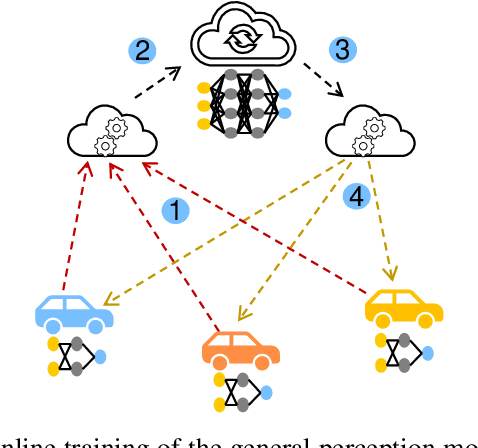
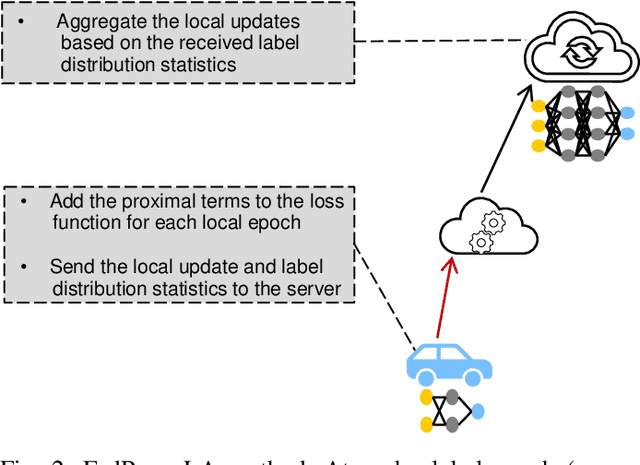
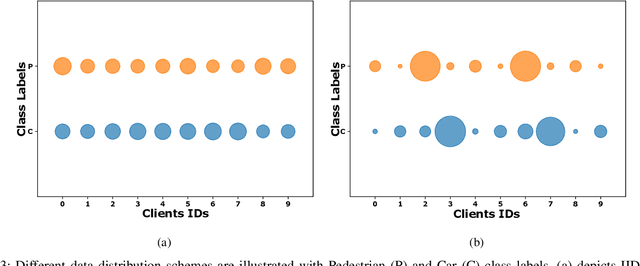
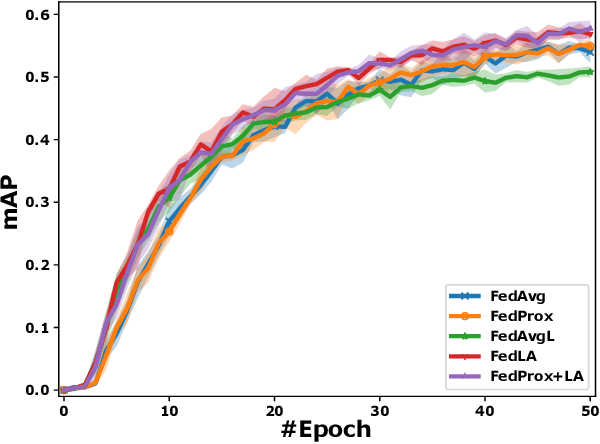
Abstract:In the pursuit of refining precise perception models for fully autonomous driving, continual online model training becomes essential. Federated Learning (FL) within vehicular networks offers an efficient mechanism for model training while preserving raw sensory data integrity. Yet, FL struggles with non-identically distributed data (e.g., quantity skew), leading to suboptimal convergence rates during model training. In previous work, we introduced FedLA, an innovative Label-Aware aggregation method addressing data heterogeneity in FL for generic scenarios. In this paper, we introduce FedProx+LA, a novel FL method building upon the state-of-the-art FedProx and FedLA to tackle data heterogeneity, which is specifically tailored for vehicular networks. We evaluate the efficacy of FedProx+LA in continuous online object detection model training. Through a comparative analysis against conventional and state-of-the-art methods, our findings reveal the superior convergence rate of FedProx+LA. Notably, if the label distribution is very heterogeneous, our FedProx+LA approach shows substantial improvements in detection performance compared to baseline methods, also outperforming our previous FedLA approach. Moreover, both FedLA and FedProx+LA increase convergence speed by 30% compared to baseline methods.
Towards Generalizability of Multi-Agent Reinforcement Learning in Graphs with Recurrent Message Passing
Feb 09, 2024



Abstract:Graph-based environments pose unique challenges to multi-agent reinforcement learning. In decentralized approaches, agents operate within a given graph and make decisions based on partial or outdated observations. The size of the observed neighborhood limits the generalizability to different graphs and affects the reactivity of agents, the quality of the selected actions, and the communication overhead. This work focuses on generalizability and resolves the trade-off in observed neighborhood size with a continuous information flow in the whole graph. We propose a recurrent message-passing model that iterates with the environment's steps and allows nodes to create a global representation of the graph by exchanging messages with their neighbors. Agents receive the resulting learned graph observations based on their location in the graph. Our approach can be used in a decentralized manner at runtime and in combination with a reinforcement learning algorithm of choice. We evaluate our method across 1000 diverse graphs in the context of routing in communication networks and find that it enables agents to generalize and adapt to changes in the graph.
Learning to Cooperate and Communicate Over Imperfect Channels
Nov 24, 2023Abstract:Information exchange in multi-agent systems improves the cooperation among agents, especially in partially observable settings. In the real world, communication is often carried out over imperfect channels. This requires agents to handle uncertainty due to potential information loss. In this paper, we consider a cooperative multi-agent system where the agents act and exchange information in a decentralized manner using a limited and unreliable channel. To cope with such channel constraints, we propose a novel communication approach based on independent Q-learning. Our method allows agents to dynamically adapt how much information to share by sending messages of different sizes, depending on their local observations and the channel's properties. In addition to this message size selection, agents learn to encode and decode messages to improve their jointly trained policies. We show that our approach outperforms approaches without adaptive capabilities in a novel cooperative digit-prediction environment and discuss its limitations in the traffic junction environment.
Know your Enemy: Investigating Monte-Carlo Tree Search with Opponent Models in Pommerman
May 22, 2023



Abstract:In combination with Reinforcement Learning, Monte-Carlo Tree Search has shown to outperform human grandmasters in games such as Chess, Shogi and Go with little to no prior domain knowledge. However, most classical use cases only feature up to two players. Scaling the search to an arbitrary number of players presents a computational challenge, especially if decisions have to be planned over a longer time horizon. In this work, we investigate techniques that transform general-sum multiplayer games into single-player and two-player games that consider other agents to act according to given opponent models. For our evaluation, we focus on the challenging Pommerman environment which involves partial observability, a long time horizon and sparse rewards. In combination with our search methods, we investigate the phenomena of opponent modeling using heuristics and self-play. Overall, we demonstrate the effectiveness of our multiplayer search variants both in a supervised learning and reinforcement learning setting.
Roadmap for Edge AI: A Dagstuhl Perspective
Nov 27, 2021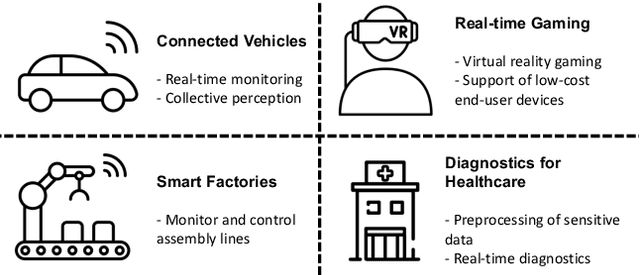
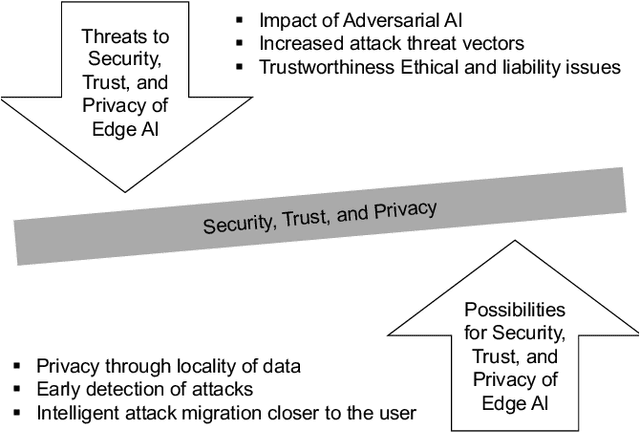
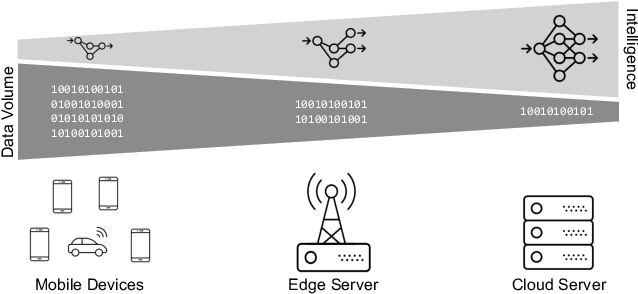

Abstract:Based on the collective input of Dagstuhl Seminar (21342), this paper presents a comprehensive discussion on AI methods and capabilities in the context of edge computing, referred as Edge AI. In a nutshell, we envision Edge AI to provide adaptation for data-driven applications, enhance network and radio access, and allow the creation, optimization, and deployment of distributed AI/ML pipelines with given quality of experience, trust, security and privacy targets. The Edge AI community investigates novel ML methods for the edge computing environment, spanning multiple sub-fields of computer science, engineering and ICT. The goal is to share an envisioned roadmap that can bring together key actors and enablers to further advance the domain of Edge AI.
I Do Not Understand What I Cannot Define: Automatic Question Generation With Pedagogically-Driven Content Selection
Oct 08, 2021



Abstract:Most learners fail to develop deep text comprehension when reading textbooks passively. Posing questions about what learners have read is a well-established way of fostering their text comprehension. However, many textbooks lack self-assessment questions because authoring them is timeconsuming and expensive. Automatic question generators may alleviate this scarcity by generating sound pedagogical questions. However, generating questions automatically poses linguistic and pedagogical challenges. What should we ask? And, how do we phrase the question automatically? We address those challenges with an automatic question generator grounded in learning theory. The paper introduces a novel pedagogically meaningful content selection mechanism to find question-worthy sentences and answers in arbitrary textbook contents. We conducted an empirical evaluation study with educational experts, annotating 150 generated questions in six different domains. Results indicate a high linguistic quality of the generated questions. Furthermore, the evaluation results imply that the majority of the generated questions inquire central information related to the given text and may foster text comprehension in specific learning scenarios.
 Add to Chrome
Add to Chrome Add to Firefox
Add to Firefox Add to Edge
Add to Edge